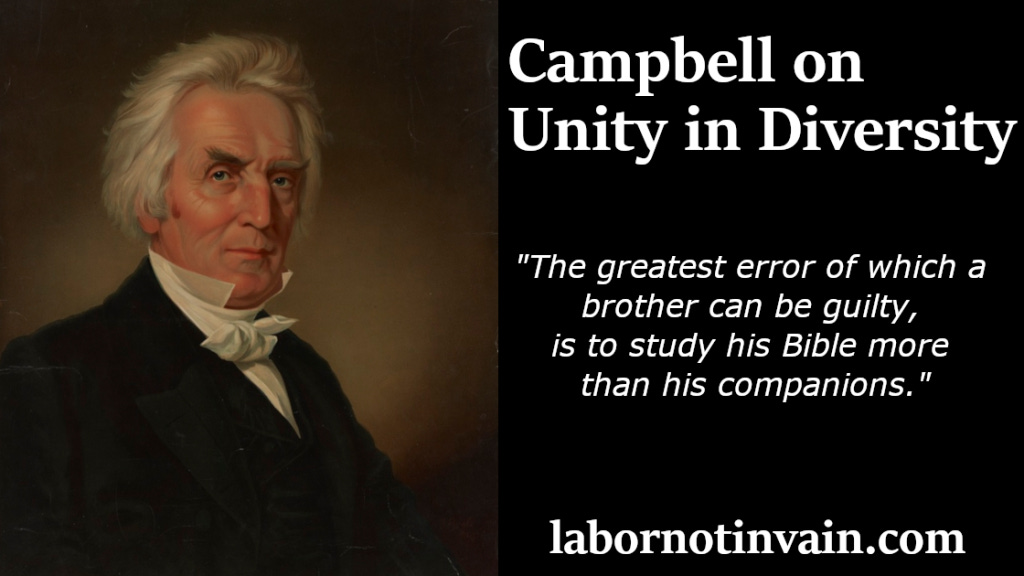Alexander Campbell: Unity in Diversity
Amongst Christians there is now, as there was at the beginning, a very great diversity in the knowledge of the christian institution. There are babes, children, young men, and fathers in Christ now, as well as in the days of the Apostle John. This, from the natural gifts of God, from the diversities of age, education, and circumstances, is unavoidable. And would it not be just as rational and as scriptural to excommunicate one another, because our knowledge is less or greater than any fixed measure, as for differences of opinion on matters of speculation?
Indeed, in most cases where proscription and exclusions now occur in this country, the excluded are the most intelligent members of the society; and although no community will accuse a man because he knows more of his Bible than his brethren, and on this account exclude him from their communion; yet this, it is manifest, rather than heresy, (of which, however, for consistency's sake, he must be accused) is, in truth, the real cause of separation.
If God has bestowed better gifts or better opportunities on one man than another, by which he has attained more knowledge, instead of thanking God for his kindness to the community, they beg God to take him away; and if he will not be so unkind, they will at length put him from them under the charge of heresy. In most instances the greatest error of which a brother can be guilty, is to study his Bible more than his companions -- or at least, to surpass them in his knowledge of the mystery of Christ.
Alexander Campbell, "To Mr. William Jones, of London, Letter IV," Millennial Harbinger 6, no. 3 (March 1835): 112
It is sad that those within the Stone/ Campbell Movement have done the very thing about which Campbell warned. The spirit of the Restoration Movement, as it was later called, demands that we continue to restore/ reform since we acknowledge that none of us have all knowledge.
I've given this illustration before in various talks, but allow me to give it again:
Imagine a long road with twists, turns, and hills. This rode goes on and on for a great number of miles. One man writes to his friend describing a beautiful river that is teeming with wildlife and is crystal clear. After reading of this account, the man turns to his friend who is walking alongside him on the same road and says, "What is this guy talking about? There ain't a river on this road! Just look around! I think he has lost it."
Sadly, what this man doesn't understand, and what Campbell pointed out, is that it can be easy for those to discount others simply because they are further down the road. It might be hard to envision such a river since we haven't experienced it ourselves, but if we have come to love, trust, and appreciate someone's knowledge and dedication to God, don't we owe it to them to seriously consider what they have to say without trying to figure out ways to disprove them before they even finish their talk?
If someone truly is our friend, it doesn't mean we have to accept what they say right now or ever, but shouldn't we stop condemning them upon the basis of, "Well I've never heard that before" or "Brother so-and-so was brilliant, but he didn't teach that!" Someone’s interpretation of the Bible, including our own, isn’t the same thing as God’s word.
Couldn't it be that it was because of Brother so-and-so's years of map-making that made it possible for your friend to find the river they see? Even if Brother so-and-so never made it that far himself?
When an archeologist dies, they don't fill up all her dig sites and make people stop dusting off pottery shards. Someone new comes in and continues the work where they left off. And that is what we do with the Bible.
We continue down the road, using and appreciating the work that was done before us, but, at the same time, acknowledging that they didn't reach the destination of perfect knowledge and we won't either, but that doesn't mean that we should give up. The more we learn, the more we understand what God has done for us, and, consequently, the better able we will be to share that joy with those who need it desperately.
Special thanks to Dr. Dallas Burdette for the quote. If you wish to read his article in which this quote is found, you can do that here:


